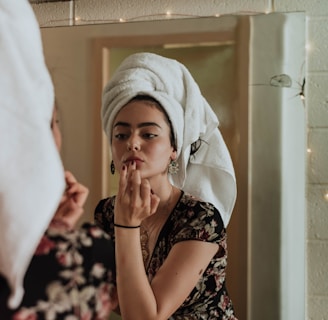The Ultimate Guide to a Daily Skincare Routine
WELLNESS
4/3/20254 min read


This post may contain affiliate links. If you click and make a purchase, I may earn a small commission at no extra cost to you. Thank you for supporting my blog!
Healthy, glowing skin doesn't happen overnight it’s the result of consistent care, the right products, and a routine tailored to your skin type. Whether you're a skincare newbie or looking to refine your routine, understanding the essentials can help you achieve and maintain beautiful skin every day.
Why Daily Skincare Matters
Your skin is the largest organ of your body and your first defense against environmental stressors. A consistent daily skincare routine offers several key benefits:
Removes impurities like dirt, sweat, and pollution
Keeps pores clear, helping prevent acne
Maintains hydration and prevents dryness
Reduces signs of aging, such as wrinkles and fine lines
Protects against sun damage and environmental harm
Improves skin texture and tone over time


Why Daily Skincare Matters
While there are many advanced skincare options, a simple routine built on core steps is effective for most people:
1. Cleanser
Start your routine by washing away dirt, oil, and bacteria. Use a gentle cleanser suited to your skin type, morning and night.
2. Toner (optional)
Toner helps balance the skin’s pH and can remove residual impurities. Choose alcohol-free formulas with soothing or hydrating ingredients.
3. Serum
Serums contain concentrated active ingredients like vitamin C, hyaluronic acid, or niacinamide that address specific concerns such as aging, dullness, or acne.
4. Moisturizer
This step locks in hydration and helps strengthen the skin barrier. Even oily skin needs moisture—just opt for a lightweight or gel-based formula.
5. Sunscreen (AM only)
SPF is the most important anti-aging product. Use broad-spectrum SPF 30 or higher every morning, even on cloudy days.
How to Properly Clean Your Skin
Wash hands first to avoid transferring dirt and bacteria.
Use lukewarm water (not hot, which can strip natural oils).
Massage cleanser into your skin for at least 30 seconds.
Rinse thoroughly and gently pat dry with a clean towel.
Avoid over-cleansing, which can irritate or dry out the skin.


Understanding Different Skin Types
Knowing your skin type is essential for choosing the right products:
Normal Skin
Balanced oil and moisture levels, few blemishes. Use a mild, hydrating routine to maintain balance.
Oily Skin
Excess sebum, shiny T-zone, prone to blackheads. Use gel cleansers, oil-free moisturizers, and clay masks.
Dry Skin
Tightness, flakiness, or dullness. Creamy cleansers, rich moisturizers, and hydrating serums.
Combination Skin
Oily in some areas (usually the T-zone) and dry in others. Use lightweight, balanced products and spot treat where needed.
Sensitive Skin
Prone to redness, irritation, or reactions. Use fragrance-free, hypoallergenic products and patch test new items.
The Role of Vitamins in Healthy Skin
Vitamins play a crucial role in skin health by supporting repair, hydration, and protection. Including them in your skincare products or getting them through diet can make a noticeable difference in your skin’s appearance and resilience.
Key Vitamins for Glowing Skin:
Vitamin C
A powerful antioxidant that brightens the skin, boosts collagen production, and helps fade dark spots and hyperpigmentation. Commonly found in serums.
Vitamin E
Known for its moisturizing and healing properties, Vitamin E helps protect the skin from environmental damage and works well in combination with Vitamin C.
Vitamin A (Retinol)
A derivative of Vitamin A, retinol speeds up cell turnover, reduces fine lines, and helps treat acne. Start slowly to avoid irritation.
Vitamin B3 (Niacinamide)
This multitasker helps strengthen the skin barrier, reduce redness, minimize pores, and regulate oil production. Great for all skin types.
Vitamin D
Supports skin cell growth and repair. While primarily synthesized through sun exposure, it can also be obtained via supplements or fortified foods.
Best Natural Foods for Glowing Skin


What you eat is just as important as what you apply to your skin. A diet rich in whole, nutrient-dense foods provides the building blocks your skin needs to stay firm, hydrated, and clear. Here are some of the best natural foods to include in your skincare diet:
1. Avocados
Rich in healthy fats and vitamin E, avocados help moisturize the skin from the inside out and reduce inflammation.
2. Berries (Blueberries, Strawberries, Raspberries)
Packed with antioxidants and vitamin C, berries help fight free radicals and support collagen production for youthful skin.
3. Fatty Fish (Salmon, Mackerel, Sardines)
High in omega-3 fatty acids, which keep skin supple, reduce redness, and prevent dryness. Also a good source of vitamin D and protein.
4. Nuts and Seeds (Almonds, Sunflower Seeds, Walnuts, Flaxseeds)
Provide essential fatty acids, zinc, and selenium—nutrients that support skin repair, oil regulation, and elasticity.
5. Leafy Greens (Spinach, Kale, Swiss Chard)
Loaded with vitamins A, C, and K, leafy greens detoxify the body, promote cell turnover, and reduce inflammation.
6. Sweet Potatoes and Carrots
High in beta-carotene (a precursor to vitamin A), which helps protect skin from sun damage and supports a healthy glow.
7. Green Tea
Rich in polyphenols and antioxidants that help reduce acne, inflammation, and signs of aging. Drink regularly for skin and overall health.
Don’t forget water! Staying well-hydrated helps flush toxins, keeps your skin plump, and enhances the effect of the nutrients you eat.
